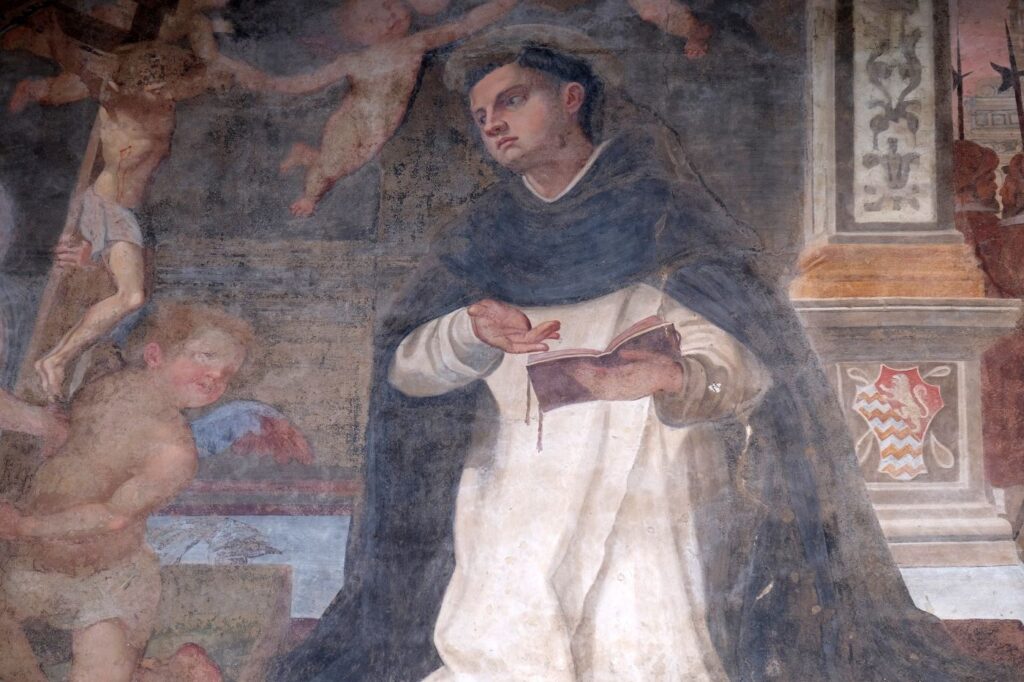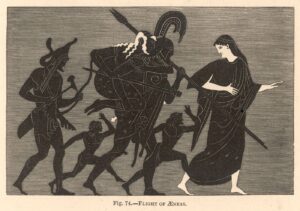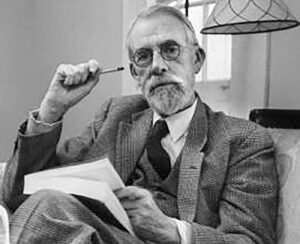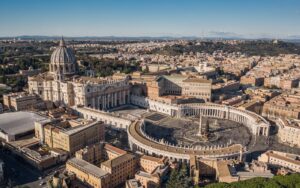It is 750 years since Thomas Aquinas died on March 7, 1274. Merely forty-nine at the time of his death and, despite a short writing career of only two decades, beset with many duties of teaching, preaching, and travel, his extant writings add up to more than eight million words—eight times those of Aristotle. These include his unfinished masterpiece, the Summa Theologica, at more than 1.5 million words. The Summa, as many have noted with chagrin, was written “to instruct beginners,” as when young children are given “milk to drink, not meat.”
Despite early condemnations of some of his teachings, Thomas was declared a Doctor of the Church in 1567, one of only thirty-seven—and not just any doctor, but the Common Doctor, capable of serving the entire Church and its unity around a common truth, the deposit of faith. Philosophers and theologians have repeatedly returned to him for clarity, insight, and creativity, since “among the Scholastic Doctors, the chief and master of all [is] Thomas Aquinas who, as Cajetan observes, because ‘he most venerated the ancient doctors of the Church, in a certain way seems to have inherited the intellect of all,’” or so claimed Leo XIII when indicating paths for “the restoration of Christian philosophy.”
Giants of theology and philosophy consulted Thomas for guidance, including (among many others) Cajetan, John of St. Thomas, Ignatius of Loyola, Charles Borromeo, Robert Bellarmine, Taparelli, Gilson, Maritain, Rousselot, Garrigou-Lagrange, Lonergan, Edith Stein, Wojtyla, MacIntyre, hosts of Dominicans, Jesuits, neoscholastics, neo-Thomists, existential Thomists, transcendental Thomists, analytical Thomists, postmodern Thomists, postliberal Thomists, and more. One can read Thomas backward and forward, so to speak, in conversation with Paul, Origen, or Irenaeus, and also Kant, Heidegger, and Wittgenstein. You can read Thomas on the Psalms, or his synthesis of Plato, Aristotle, Augustine, Denys the Areopagite, and Avicenna, just as you can read a Thomist on quantum physics, contemporary jurisprudence, or metaethics.
Not as admired by the Orthodox and with a somewhat mixed reception by Protestants, nonetheless Thomas served as a major source for the salutary and influential developments of the past half century within orthodox Protestant, Anglican, and evangelical philosophy, a development contributing significantly to the confident place of philosophy of religion within large swaths of contemporary Anglo-American philosophy.
Start your day with Public Discourse
Sign up and get our daily essays sent straight to your inbox.Let’s not forget his eucharistic poetry, either, which puts paid to facile claims about his dry logic and cold rationalism. No accident that the Thomist ranks include Fra Angelico, Dante, Flannery O’Connor, Walker Percy, and (maybe) T. S. Eliot.
Albert the Great was correct; his student, nicknamed the “Dumb Ox” for his rotund frame and taciturn personality, would roar so loudly the world would reverberate with his bellows. Not merely eight million words, but an inner richness allowing synthesis of all truth wherever it could be found (and whatever its source), a fecund generativity such that principles articulated by him could be placed into productive conversation with thinkers of quite different commitments, in significantly different contexts, like, say, Descartes, or Gadamer, or Kuhn. Thomas possessed not just a remarkable intellect; his was an intellect for the ages, one of the few actual geniuses of the world. His intellect is generative enough to give rise to thought in other intellects, almost too much, at times, and one can query, as does MacIntyre, whether there are “too many Thomisms.”
I’m a Thomist, and a pretty thoroughgoing one, although not of the strict observance. Thoroughgoing enough, though, that my regard for him has caused occasional embarrassment, as, for instance, when arguing with a pacifist friend about just war I interrupted as he began to say, “Jesus in the Sermon,” with “sure, sure, but Thomas says.” An awkward response for a Christian to make. I didn’t apologize, and I don’t, since if you want to understand Jesus on the just use of violence you are, in fact, better guided by Thomas than by Yoder. Thomas knows.
A temptation immediately lurks within this accomplishment, however; namely, to ignore, overlook, or forgo the intelligence of Aquinas for the conclusions of Aquinas, attempting to bypass thought itself. How alluring it is to have knowingness, that disposition by which “whatever it is you are about to say, whatever it is I am about to read, whatever I might hear, it’s nothing new, I know it already, I heard it myself sometime last week, if not before.” One meets a certain kind of Thomist for whom there are no more questions to be asked, for has not Thomas asked all of them already in the (roughly) three thousand articles and ten thousand objections and responses of the Summa? Haven’t the Thomistic manuals summarized and organized the school so that all can be approached and digested in the most pedagogically efficient manner? Or, “Isn’t it true because Thomas argues thus?” If you think I exaggerate, ask a non-Thomist her impressions of a Thomist.
This is especially evident when conceptualism interferes with and replaces the task of intelligence. Here in theology, philosophy, and most mischievously in ethics and politics, it is forgotten that those concepts that form propositions are not free-floating realities but articulations of an act of intelligence, insight, by which intelligibility is grasped; the concept itself is not the grasp of the intelligible but an articulation of the inner word, the verbum, without which it is just air. Concepts relate to concepts to form propositions, propositions relate to propositions to form arguments, arguments relate to arguments to form systems. But if one is careless, one can memorize and repeat an entire system of words, with rules of proper usage and awards and tenure given to those who follow the linguistic rules most aptly, without thought ever occurring, without the acts of intelligence through which and by which concepts have their vitality and explanatory force. This is philosophy as catechism, as memorization, as the putting together of a puzzle upside down, with each piece fitting into its proper slot and all the pieces into an entire puzzle, but leaving blank cardboard rather than the view of Paris or the Grand Canyon or whatever the front of the puzzle actually shows. (Frankly, a whole lot of academic philosophy is like this.) When asked to think, such a philosopher moves his eyes up and to the right, the way a middle schooler in theater class does when trying to remember lines from Hamlet. They are trying to reconstruct words, to remember answers, all of which can be done without thinking through the words to the intelligence that gives them meaning and to those insights of intelligence that genuinely hook into the real.
Thomas does not do this. Alas, his epigones sometimes do.
Conceptualism and knowingness are especially tempting during times of breakdown and crisis, real or apparent. If one looks at the state of the world, politics, or religion, the sense of decadence, decline, unseriousness, and drift can seem overwhelming. We live in liquid modernity where the old certainties are in flux, venerable truths questioned, ancient authorities unmasked—the “falcon cannot hear the falconer.” Some people relish this, experiencing exhilaration at vertigo; others, perhaps “seared with trade; bleared, smeared with toil,” are very much lost in the world, “getting and spending, [they] lay waste [their] powers,” noticing nothing very much at all; still others, aghast at the loss, proclaim “let us weep, lament the enormity of the loss. Let us smear our faces with coal, loosen our hair.” For the last sort, there can be enormous relief and comfort in set answers, a closed system, a tradition that has already provided principles to resolve the questions, quandaries, and terrors of our loss.
To do so, however understandably, forgets how daring Thomas was. He attempted, with startling success, to synthesize Jerusalem, Athens, and Rome. He took the foreign gold of pagan thought, including the newly rediscovered and thus suspect Aristotle, along with Scripture, the Church Fathers, Islamic commentary, science as then understood, logic, the disputed questions, the Sentences, understood them all in their own terms, and forged a synthesis—while, it should be added, having rejected the prestige and comfort of an established order to join the relatively new Order of Preachers. His synthesis was sufficiently powerful to allow for the multiple Thomistic revivals of the sixteenth, seventeenth, and twentieth centuries, each capacious and lively enough to rise to the level of their time. This is a daring man; certainly one with a prodigious memory but not one who memorized answers without thinking.
Thomism is a tradition of thought, perhaps one of the three main options of the moment, at least in moral inquiry. But as is often noted, tradition is the living faith of the dead rather than the dead faith of the living. Tradition is not traditionalism, not a decadent version of stasis, nostalgia, fundamentalism, or dogmatism. Tradition, when alive and reasonable, has its own sources and reasons, can account for them in its own terms, but can understand other accounts and engage in some translation from those accounts, including incorporating truth from opposing views without losing inner coherence and integrity—all while answering objections and maintaining its explanatory force in the face of new data, new questions, new contexts. Tradition is handed on not as a dead and closed thing but in trust for others to steward, repair, develop, or augment, and sometimes that takes daring. Tradition is confident without obnoxiousness, bold without belligerence, and knowing without arrogance.
In a time of crisis, the temptation is to huddle in, turn inward, rest in what one already knows, and find comfort in the security of a system. This is not Thomism, which exists as a servant to all reasonable people of goodwill.
I have, as a prized possession, a photocopy of W. Norris Clarke’s lecture notes on The Central Problem of Metaphysics. In it I have written a comment, told to me by my first teacher of Thomas, Peter Kreeft: “What is needed is not great Thomists but little Thomases.” That is, Thomas himself would be far less interested in disciples quoting him correctly, or spending their energies battling about how to interpret him, than in their doing as he did, insofar as they are capable, engaging the problems, quandaries, and intellectual tasks of their moment. Those tasks are enormous, gravely so, and we do not meet our obligations by turning inward to jealously maintain our intellectual property and propriety. To be a Thomist requires knowing Thomas, but to be a good Thomist, a little Thomas, is to, like Thomas, be cheerfully at home in all the questions and problems of our moment.
There is an unfortunate tendency for those of a conservative, traditional, or orthodox bent to fulminate against the errors of the time and retreat behind the barricades. In my own religious circles, which I take to be not dissimilar to the mood of other communities, there is an awful lot of “shop talk” about Rome, the pope, this or that celebrity Twitter account, who said what about whom, and so on. Great minds think about ideas, mediocre minds think about events, and shallow minds think about people, I once heard said. Far too many conservatives have allowed a creeping mediocrity into their lives—me, too, I’m afraid. But the human intellect has being as its first object or intention, and being as good seeks to communicate itself as far as possible. Truth, or our grasp of reality, is a common good, thus, something shared with others, a good in which no one loses if another intellect also possesses. More: our intellect, as good, thrives when seeking to communicate what it knows to others, in service to them and the commons.
Intellectual retreat, abandoning the field, either by hiding among friends, limiting our scope of questions to what we already know, refusing to engage, or simply turning away from the mind’s own proper object, is a kind of infidelity. It betrays, too, a fundamental lack of hope, daring, and confidence. Thomas knew nothing of that. A contemplative in many ways, but one at the very center of the most important questions and disputes of his day, he was boldly sure that the truth of things could be known, explained, and reasoned through, including with others vastly different from himself. Hence, his intellectual endeavors were acts of charity, acts of mercy. The task hasn’t changed, for anyone.
John Paul II gave Thomas another title in addition to the Common Doctor and the Angelic Doctor: Doctor of Humanity. Thomas helps us understand “the truth about the good of man” and was “always ready to receive the values of all cultures.” In a time of crisis, the temptation is to huddle in, turn inward, rest in what one already knows, and find comfort in the security of a system. This is not Thomism, which exists as a servant to all reasonable people of goodwill.
Thomas Aquinas had an intellect fully alive. We might not share his title of Doctor of Humanity, but we have the same obligation: to cheerfully explore all, in service of all, for the good of all. Thomas would have us avoid the enclosed mode, to raise our minds to his level and by so doing reveal the truth of the human and the good of every human being. That requires the boldness of Thomas, his daring, and his intellect. We’re well-served to read, mark, and inwardly digest his writings, to be sure, but we’ll do better to become like him, in our own, limited ways, and thus allow not merely Thomism, but intelligence, to thrive—an intelligence evident in his life, a generative liveliness we’ll celebrate at the 1,500th anniversary of his death, if we keep the tradition.
Image by zatletic and licensed via Adobe Stock.














